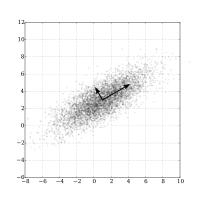
Photo from wikipedia
In this paper, a data-driven linear clustering (DLC) method is proposed to solve the long-term system load forecasting problem caused by load fluctuation in some developed cities. A large substation… Click to show full abstract
In this paper, a data-driven linear clustering (DLC) method is proposed to solve the long-term system load forecasting problem caused by load fluctuation in some developed cities. A large substation load dataset with annual interval is utilized and firstly preprocessed by the proposed linear clustering method to prepare for modelling. Then optimal autoregressive integrated moving average (ARIMA) models are constructed for the sum series of each obtained cluster to forecast their respective future load. Finally, the system load forecasting result is obtained by summing up all the ARIMA forecasts. From error analysis and application results, it is both theoretically and practically proved that the proposed DLC method can reduce random forecasting errors while guaranteeing modelling accuracy, so that a more stable and precise system load forecasting result can be obtained.
Journal Title: Journal of Modern Power Systems and Clean Energy
Year Published: 2018
Link to full text (if available)
Share on Social Media: Sign Up to like & get
recommendations!